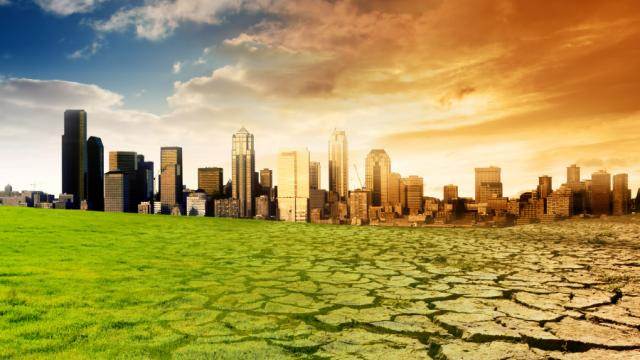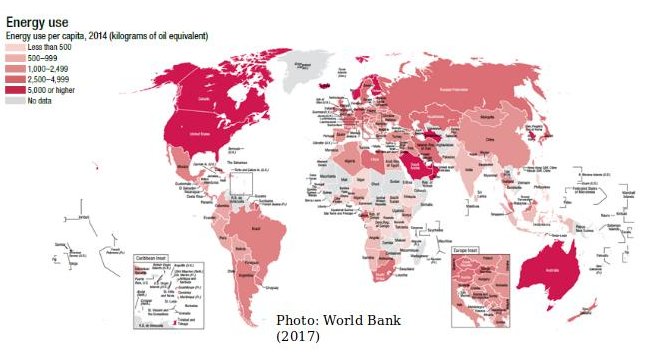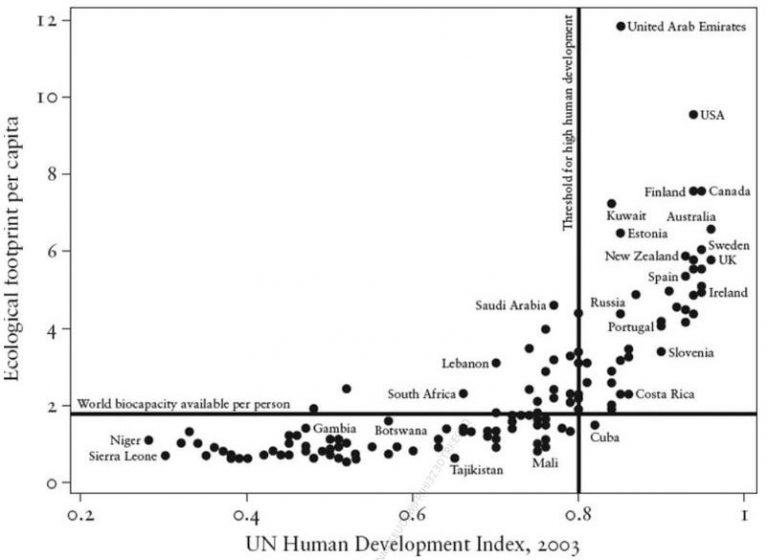
Does a good life have to cost the earth?
by James Neary
For many years countries within the global South have faced the uphill battle of development with one eye on their Northern counterparts. In a world engulfed by capitalism, the common measure of a country’s development is through how rich they are as indicated by gross national income (GNI). You probably don’t need to even look at recent GNI figures to know that within the top 20 are countries like the Norway, United States, United Kingdom, Australia (World Bank, 2016) and other wealthy Western countries that you would guess to be there. These nations have become synonymous with ‘the good life’, where the standards of living are seen as the highest and to which everyone should aspire to. Whether that is an adequate measurement, however, divides opinions and depends on how you measure a good life.
If money is all that is required to obtain the good life, then there are several countries that should have it, but when you look behind the figures, it is abundantly clear that they don’t. You need to look no further than Equatorial Guinea as a prime example. With their rich oil reserves; the African country is ranked by the World Bank as an upper middle-income country, on par economically with several Eurasian countries such as Russia and Turkey (World Bank, 2017). However, beneath their economic performance we find widespread poverty with three-quarters of its population living below the poverty line (Blas, 2014), and other poor social and human development indicators such as an average life expectancy of just 57.9 (United Nations, 2016). This surely demonstrates that the heavy focus on the economic performances of countries can often mask other issues such as inequalities that exist within them.
Further issues not highlighted by economic measures of development are those involving the environment. The aspiration for limitless economic growth has seen the earth stripped of its natural resources. Climate change has taken a front seat in political conversations with leading politicians advocating sustainable development. However, according to the World Bank (2017), energy use worldwide has increased by more than 55% between 1990 and 2014. Unsurprisingly, high-income economies monopolise most of this, using four times more energy per capita than lower ranked economies, with the highest usage being from North America (World Bank, 2017).
As such, Western societies have to face the moral injustice that lies in the fact that they themselves have abused the environment for so long but now preach for sustainable development elsewhere. The unrelenting pursuit of profit would seem to be incompatible with the concept of sustainability, meaning compromise through less consumption must be achieved if international sustainable development goals are to be met.
Skeptics may question whether sustainability will cost Western societies their good quality of life. If what makes a good life are social human development goals such as long happy healthy productive lives, then other countries are able to meet these acceptable living standards far more ecologically than us, proving that it can be done. Cuba, for example, was noted in 2003 to be the only country in the world which has been able to meet the quality of life standards such as life expectancy and education, as measured by the Human Development Index, whilst maintaining a low ecological footprint (Wilkinson and Pickett, 2010). Other countries such as Costa Rica come extremely close.

Photo: Wilkinson and Pickett (2010)
Closer analysis of the 2016 Human Development Index Report (United Nations, 2016) data reveals that Cuba’s average life expectancy is 79.6 years, with 84.8% of their population having some secondary school education, with a GNI of $7,455. This compared to the USA, whose life expectancy is marginally less at 79.2 years, with 95.3% of their population having some secondary school education and a GNI of $53,245. Carbon dioxide emissions show that Cuba uses 3.5 tonnes per capita, whilst the USA uses 16.4 tonnes per capita. In terms of renewable energy, 18.9% of Cuba’s consumptions come from renewable energy compared to only 7.9% of the USA’s (United Nations, 2016).
These statistics show that a good quality of life needn’t cost the earth to achieve. Countries can meet their usual high living standards without high ecological footprints by adopting more sustainable energy practices and, most importantly, decreasing consumption. If other countries are able to match all of our human development indicators but use less money and less energy, then perhaps the question that such statistics propose is whether our societies are in fact overdeveloped and whether we are really the ones who developing countries should be aiming to emulate?
Offline references
Wilkinson, R. and Pickett, K. (2010) The Spirit Level: Why Equality Is Better For Everyone. London: Penguin Books.
World Bank (2017) World Development Indicators 2017. Washington, DC: World Bank
United Nations (2016) Human Development Report 2016: Human Development For Everyone. New York: United Nations.

0 Comments